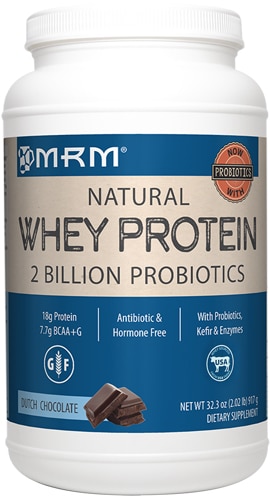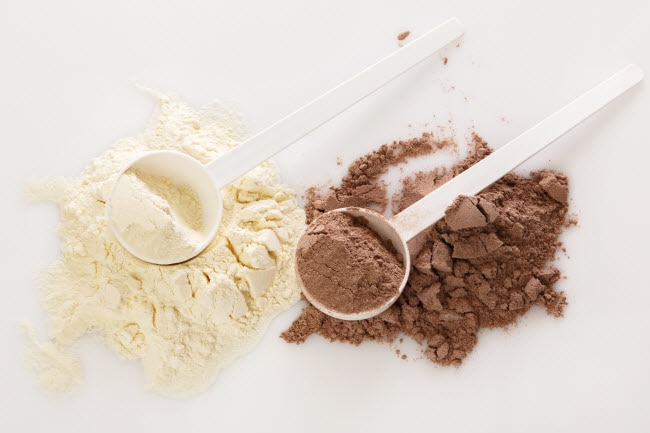Protein is an essential nutrient for the body, especially if you’re looking to build muscle. Depending on your activity level, the acceptable macronutrient distribution range (AMDR) for protein is between 10 and 35 percent of your daily caloric intake, according to the American Journal of Clinical Nutrition. The more active you are, the more protein you need.
While you can meet your daily protein needs with whole, protein-rich foods, the International Society of Sports Nutrition Journal believes that supplementation is the most practical way to ensure you get enough protein before and after exercise.
The most common way to supplement this macronutrient is with protein powder, which comes in two standard varieties—whey and plant-based. Each of these can be beneficial, assuming the ingredients are natural, non-GMO and contain no artificial sweeteners or processed additives. However, there are important distinctions to consider when choosing between the two options.
Before choosing one or the other, get the breakdown of whey vs plant protein so you can make the best choice for your body.
Whey contains milk/dairy; Plant-based is vegan-friendly
Dairy is made up of casein, the solid portion, and whey, the liquid portion. Whey is separated from casein in the manufacturing process, and this byproduct is then dried into a powder. The two main forms of whey powder are concentrate and isolate, and each have their own benefits.
Whey concentrate has more biologically active compounds, which makes it ideal for athletic performance. However, whey isolate is considered the “purest source available” with a protein content of “90% or higher,” according to the Journal of Sports Science and Medicine.
Whey isolate is also deemed safe for those with lactose intolerance to consume because it only contains trace amounts of the lactose sugar.
However, if you’re vegetarian or vegan, or simply want a vegetarian protein option, plant-based protein is a nutritious alternative. The most common protein sources in plant-based powders are brown rice, soy, hemp and pea protein. In a 2015 study, pea protein was also found to be just as effective as whey when measuring increases in “muscle thickness” making this a great option for meat-free athletes.
Whey is a complete source of amino acids; plant-based is not always
One important benefit of whey protein is that it contains all nine essential amino acids that the body cannot produce on its own. This makes it a complete protein. Whey also tends to digest quickly, so the muscle protein synthesis (MPS) activated by these amino acids can be absorbed and metabolized in the body at a rapid pace, according to the Nutrients Journal. In other words, the protein can work faster in your body.
For this reason, whey promotes energy and stamina during your workout, and then boosts your muscle growth and repair when you’re done.
By contrast, in most cases, plant-based protein is considered an incomplete protein, lacking some of the nine amino acids. The most frequently absent of the amino acids are methionine, isoleucine, lysine, threonine and tryptophan, explains the International Society of Sports Nutrition Journal.
Soy-based protein powders, however, do contain all nine amino acids because soy is one of the only plant foods that is considered a complete protein. The good news is, you don’t have to worry about filling that “gap” of amino acids with complementary proteins, says Trinh Lee, MPH, RD:
“Eating a combination of incomplete proteins provides the essential amino acids your body needs. While you don’t have to eat the complementary protein foods at the same meal, try to eat a variety of complementary incomplete proteins throughout the day.”
Both whey and plant-based proteins can optimize resistance training
Consuming plant or whey protein is an individual choice and both are effective and nutrient-rich in different ways. One shared advantage is that both provide the right amount and kind of fuel to help you get the most from your resistance training. In fact, research documented in the International Society of Sports Nutrition Journal indicates that 48 grams of whey and rice protein can yield the same gains in muscle development and body composition over the course of a two-month fitness regimen.
This study found that the concentration of amino acids from a high-protein supplement maximizes kinetic digestion and absorption when consumed prior to exercise. In other words, the body’s internal processes to convert food into power and strength are increased with protein, regardless of whether it’s whey- or plant-based.
Choose plant versus whey: you can’t lose
Whether you favor whey or plant-based, the goal is to enrich your wellness and optimize your workouts—and both forms will help you do that. Be sure to check ingredients and choose the protein powder that will best support you both in muscle gains and overall nutritional health. That means avoiding an excess of added sugars, GMO ingredients and additives. All you have to do is make your choice, and get ready to reap the benefits.




